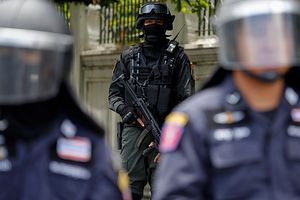Two days after declaring martial law, the Royal Thai Army has launched a coup in a bid to end the violent conflict between government supporters and opposition forces.
Historians may debate whether to consider the imposition of martial law as the start of the real coup, although some have already called it a soft or disguised coup. For now, the essential question is whether it will succeed in solving the country’s political crisis.
Based on Thailand’s history of coups over the past century, there is little reason to suggest the current military intervention will restore political stability. It is possible that Thailand’s deep political divisions can partially be attributed to the 2006 coup, which led to the ouster of then Prime Minister Thaksin Shinawatra.
When the army announced the suspension of the 2007 Constitution (excluding provisions concerning the monarchy), several Thai analysts noted it was the army that drafted the document. Perhaps it will initiate the drafting of a new constitution to again this time reform the country’s political system. But what if the envisioned reforms don’t materialize?
Understandably, there are many Thais who have already grown weary of the incessant political fighting in recent years. Many have also become cynical toward the electoral process, which has been discredited because of the money involved. Perhaps for these reasons, among others, some frustrated Thais favor intervention by the military to restore the country’s confidence in its political system.
But Thailand’s political impasse can partially be laid at the army’s feet. Through the 12 successful coups it has staged since 1932, the army has had several opportunities to prove that it can be the key to stabilizing Thai politics. This has yet to happen, so why repeat the process over and over?
Some Bangkok residents may have felt relieved to see their streets clear of anti-government protesters, or government supporters threatening to launch political action. The police were unable to disperse the protesters over the past six months, yet the army did so within the last two days.
As a result, the army imposed a nighttime curfew, banned public gathering of five or more people, and closed down TV and radio stations. When martial law was declared, free speech was threatened. The army deployed soldiers to control the newsrooms and offices of media stations, and attempted to censor social media.
The protesters have gone home, but the army is now in control of the government. Before the coup, there were reports that elections would be conducted after substantial reforms were undertaken over the next two years. After the coup, election chatter was replaced by news of the army chief becoming the country’s de facto prime minister.
Even as Thailand’s neighbor Myanmar formally shuns direct military rule in favor of a shift toward a parliamentary democracy, Thailand seems to be regressing.
Many Thais claimed they were not afraid to see soldiers patrolling key intersections in Bangkok, the country’s capital. Some of them even snapped photos of themselves with these soldiers. Take away these happy snaps, however, and what is left is the image of an old guard seeking to silence dissent and take power.
Thailand’s democracy is imperfect, but it is not beyond redemption. With its coup, the military has made it more difficult to fix the problems that challenge Thai society.

































